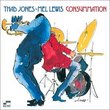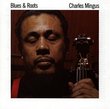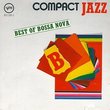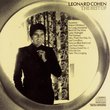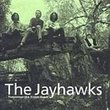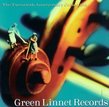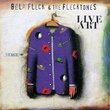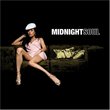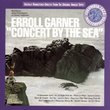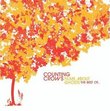| All Artists: Charles Mingus Title: Let My Children Hear Music Members Wishing: 3 Total Copies: 0 Label: Sony Original Release Date: 1/1/1992 Re-Release Date: 4/21/1992 Genres: Jazz, Pop Styles: Avant Garde & Free Jazz, Modern Postbebop, Swing Jazz, Bebop Number of Discs: 1 SwapaCD Credits: 1 UPC: 074644891027 |
Search - Charles Mingus :: Let My Children Hear Music
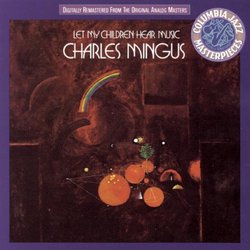 | Charles Mingus Let My Children Hear Music Genres: Jazz, Pop
Ambitious is perhaps the best way to sum up this 1971 large-ensemble recording. It hearkens back to Black Saint and the Sinner Lady in some important respects--chiefly the sense of vertical sprawl in the tunes, the sheer p... more » |
Larger Image |
CD DetailsSynopsis
Amazon.com essential recording Ambitious is perhaps the best way to sum up this 1971 large-ensemble recording. It hearkens back to Black Saint and the Sinner Lady in some important respects--chiefly the sense of vertical sprawl in the tunes, the sheer presence of so many instruments doing so much at the same time. It also importantly pointed to the omnipresence of Duke Ellington as an orchestral influence. Mingus scores the baritone sax the way Ellington had done, as part rhythm, part road marker, and part stir stick for the swirls of energy generated on tracks like "Hobo Ho." The sessions for Let My Children remain blurred as far as detail goes, but it's clear that James Moody and Bobby Jones do spectacular jobs soloing amid a dense crowd of ensemble movements and passages. And the version of "The Shoes of the Fisherman's Wife" is so heartfelt and moving that you almost miss the monumental complexity of the piece. --Andrew Bartlett Similar CDs
Similarly Requested CDs
|
CD ReviewsThe resounding final statement of a true American maverick. Samuel Chell | Kenosha,, WI United States | 09/06/2008 (5 out of 5 stars) "Even if you disagree with Mingus' assessment of this as his greatest recording, the musical evidence is sufficiently compelling to make you respect the composer's judgment. Mingus was a larger-than-life figure and dreamer of Faustian proportions, though his projects frequently fell short of realizing their maker's designs. In some respects, he's remarkably similar to the filmmaking genius, Orson Welles (and not only in terms of artistic vision). After the controversy and commercial failure of "Citizen Kane," Welles was largely sentenced to pursuing his Promethean ambitions with self-financed films on shoe-string budgets that simply could not conceal their frequently ragged, unpolished production values.
Recent recordings like Mingus' UCLA and Cornell concerts often show much of the same disparity between the artist's lofty conceptions and inadequate resources for implementation of them (in terms of money, time, personnel, promotional agents, circulation channels). But with the help of arranger Sy Johnson, Mingus came closer than ever to realizing the "grand design" in "Let My Children Hear Music," which amounts to a literal and fitting "valedictory" by the composer-bassist-leader. Call the music portentous and pretentious: it IS. Romantics, dreamers, visionaries, idealists always ARE. And lest there be any doubt, the liner notes quoting Mingus on the project are practically a jeremiad on the state of art and culture in the late 20th century. Like Welles, William Blake, Shelley, Pound and perhaps all under-appreciated or ignored geniuses, Mingus was a true "maverick" (quite unlike the Presidential candidate who claims the title because he disagreed with his commander-in-chief 10% of the time), distancing himself from liberal revolutionaries as much as conservative stand-patters. As his program notes make clear, Mingus wanted to liberate listeners by opening their ears not just to the music of the present but to the brilliant compositional structures of the past. He was at once "progressive" and "conservative," intensely committed to conserving the best music by insisting that it be heard amidst the frequent noise of the present. "Let My Children Hear Music" is Mingus writ large (if that's possible), music that's more absorbing compositionally than some of the earlier recordings of these same works. If there's a deficiency to the music, it's ironically the comparative absence of the normally irrepressible Mingus himself. The program opens with a thrilling "Shoes of the Fisherman's Wife" that practically recalls Strauss's "Death and Transfiguration." Yet the impact of the piece is partially dependent on the listener's familiarity with previous, less polished and fully "orchestrated" versions of the composition. Soon, the textures of the program tend to overwhelm individual soloists and even Mingus. In terms of a final result doing justice by each of the personalities in the ensemble while representing in full the character of the leader, Mingus inarguably falls short of his hero, Ellington. All the same, the textures and scale are in themselves a wonder, and the saxophones of the ageless James Moody and the noble (if wronged) soldier Bobby Jones are added "clinchers" to this fascinating, if not essential, recording. Looking at Amazon's current price for this item and factoring in a tax and postage-free transaction, I'd be surprised if you found many better values on Amazon. But don't take it for granted. Some of Ellington's best music is currently unavailable. In the "culture" of the present, as Mingus himself sensed, there are major obstacles to being heard. Why not pick up a boxful of these and hand them out to young people in exchange for a promise to give up some of the time devoted each day to the Xbox, iPhone, and Face Book. (I know--what to do about the problem of the suddenly obsolescent CD player?) As loud, omnipresent, and inescapable as the "medium" has become, Mingus was enough of a maverick to believe there's still a message that needs to be heard. Some of us are old-fashioned enough to agree with him." |

 Track Listings (7) - Disc #1
Track Listings (7) - Disc #1